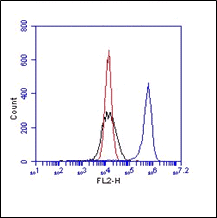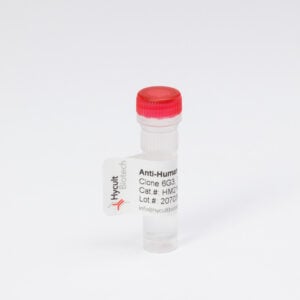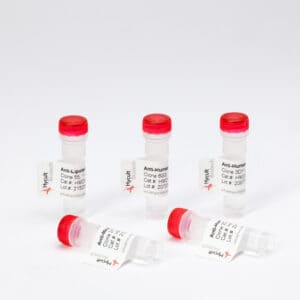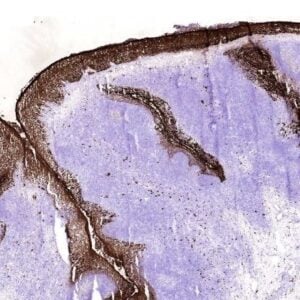Beta1 Integrin, Human, mAb BV7
€133.00 – €456.00
The monoclonal antibody BV7 recognizes human ß1-integrin. Beta-1 integrin is a ubiquitously
expressed ~89 kDa type I transmembrane protein functioning as receptor when heterodimerized with
one alpha subunit. It belongs to the integrin beta chain family consisting of four different genes,
encoding multiple β-integrins via alternative splicing. Ligand-recognition depends on the composition
of the heterodimer: either collagen, fibronectin, VCAM1, laminin, cytotactin, osteopontin, epiligrin,
thrombospondin and CSPG4 can bind to the integrin-complex. Beta-1 integrins recognize the
sequence R-G-D in a wide array of ligands. Isoform beta-1B interferes with isoform beta-1A resulting
in a dominant negative effect on cell adhesion and migration (in vitro). In case of HIV-1 infection, the
interaction with extracellular viral Tat protein seems to enhance angiogenesis in Kaposi’s sarcoma
lesions. When associated with α7, β1-integrin regulates cell adhesion and laminin matrix deposition.
BV7 is active on HT-29 colon carcinoma cells and on HCCP-2998 tumor cells. It is involved in
promoting endothelial cell motility and angiogenesis. Furthermore, β1-integrin plays a mechanistic
adhesive role during telophase, and is required for the successful completion of cytokinesis.
Upon activation integrins in general, including β1-integrin, are known to exhibit global structural
rearrangements and exposure of ligand binding sites. β1-integrin modulation is of importance in tissue
repair and regeneration. In cultured primary hippocampal neurons, astrocytes and tissues, cell surface
expression of amyloid beta fibrils (key hallmark of Alzheimer’s disease) selectively co-localized with
β1-integrin. Preincubation of cells with antibodies against β1-integrin, as well as α1-integrin, greatly
enhanced amyloid beta-induced apoptosis, indicating a protective role for integrins in apoptosis.
The monoclonal antibody BV7 does not recognize α5β1 complex and not the cytoplasmic part of the
β1-subunit. Monoclonal antibody BV7 is active on HT-29 colon carcinoma cells and on HCCP-2998
tumor cells. BV7 binds to several other tumor cells (MG3 osteosarcoma, A375 melanoma, MHCC-
1410 and Lovo colon carcinoma) but does not affect adhesion to endothelial cells.
FS: Antibody BV7 functions as an inhibiting antibody. The antibody was functionally tested by adhesion assay (ref 1), chemotaxis (ref 2), patch clamp analysis (ref 3) and neurotoxicity induced apoptosis (ref 4).





